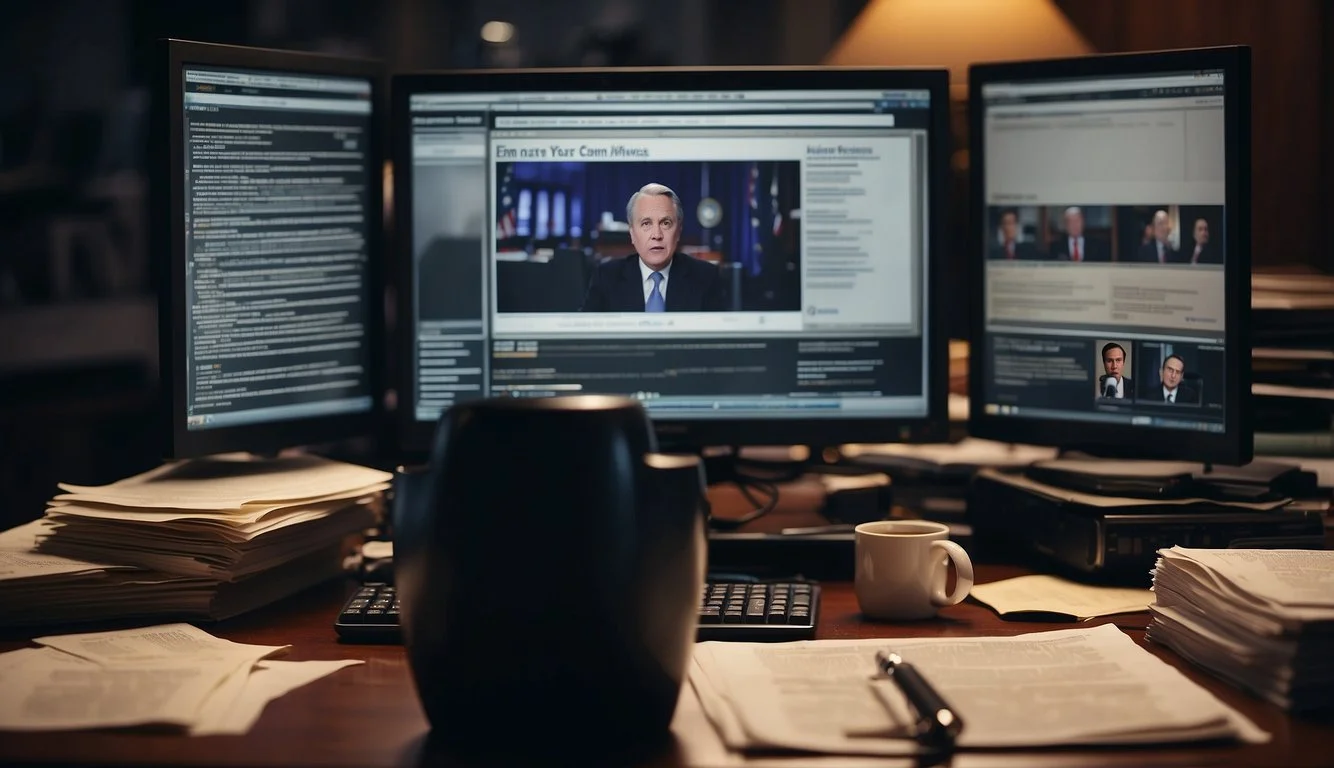Documentary Review: Citizenfour (2014)
A Deep Dive into Mass Surveillance
The 2014 documentary "Citizenfour," directed by Laura Poitras, offers a gripping and intimate look at whistleblower Edward Snowden’s revelation of extensive government surveillance. This film captures the tension-filled days before, during, and after Snowden's disclosures about the NSA's practices, making it both a critical historical document and a compelling human story. With its candid, real-time footage, "Citizenfour" provides viewers with an unprecedented front-row seat to these significant events.
Through interviews and raw footage, the documentary showcases Snowden’s astonishing bravery and the grave risks he took to expose truths about privacy and government overreach. The film not only highlights the legal and ethical dilemmas but also paints a vivid portrait of Snowden as a person—thoughtful, articulate, and unbelievably courageous under pressure.
The critical acclaim for "Citizenfour," including its Oscar win, underscores its impact and relevance. For anyone interested in issues of privacy, government transparency, and the role of whistleblowers, this documentary is a must-watch, revealing the stark realities of modern surveillance and its implications for democracy.
Background of 'Citizenfour'
"Citizenfour" is a documentary directed by Laura Poitras. It premiered in the United States on October 10, 2014, at the New York Film Festival and in the United Kingdom on October 17, 2014, at the BFI London Film Festival. The film delves into the infamous NSA spying scandal through the lens of whistleblower Edward Snowden.
The documentary centers around Snowden, a former contractor for the National Security Agency (NSA). He leaked classified documents revealing the extent of global surveillance programs run by the NSA and other intelligence agencies. Poitras, an experienced documentarian, captures real-time footage of events as they unfold.
The film has received critical acclaim for its tense, real-life narrative. It won the Academy Award for Best Documentary Feature in 2015. Poitras collaborated with journalists Glenn Greenwald and Ewen MacAskill to capture Snowden’s disclosures and his thoughts on privacy and government intrusion.
Key Figures:
Edward Snowden: The whistleblower revealing the NSA’s global surveillance.
Laura Poitras: Director of Citizenfour.
Glenn Greenwald: Journalist featured in the documentary.
Significant Dates:
US Premiere: October 10, 2014
UK Premiere: October 17, 2014
Snowden’s background adds depth to the narrative. Raised in a military family, he worked as an NSA contractor before leaking the documents. Poitras, alongside producers Mathilde Bonnefoy and Dirk Wilutzky, ensures the film combines investigative journalism with compelling storytelling.
The film’s real-time unfolding of events provides an authentic glimpse into the high-stakes world of national security and personal privacy. This section outlines the foundational aspects, laying the groundwork for further discussion of the documentary's impact and content.
Synopsis of the Documentary
Citizenfour, directed by Laura Poitras, is a gripping documentary that chronicles the events leading up to and following Edward Snowden’s disclosure of classified NSA documents.
The film opens in January 2013, when Poitras receives encrypted emails from an anonymous source, identifying himself as Citizenfour.
Within a few months, Poitras, journalist Glenn Greenwald, and Snowden meet in a Hong Kong hotel. Most of the documentary unfolds here, capturing the tense and candid conversations as Snowden explains the extent of NSA’s surveillance activities.
Snowden, a former CIA system administrator, reveals how the NSA has been covertly collecting data on millions of citizens. These revelations are not just technical; they are deeply personal, affecting individuals' privacy rights.
The film also documents the subsequent media firestorm and legal ramifications of Snowden's disclosures. It portrays the meticulous process of verifying and disseminating the leaked information.
Key Figures:
Edward Snowden: The whistleblower who exposes the NSA's extensive surveillance.
Laura Poitras: The director who brings the story to light.
Glenn Greenwald: The journalist who collaborates on reporting Snowden's revelations.
Citizenfour is notable for its direct access to Snowden during this pivotal period. The documentary provides an unfiltered look into the moral and ethical considerations that prompted Snowden’s actions.
Through this intimate portrayal, Citizenfour raises crucial questions about state surveillance and individual privacy, provoking thought and debate among its viewers.
Production and Filmmaking
Citizenfour, directed by Laura Poitras, offers a unique glimpse into the initial meetings between Edward Snowden and journalists. Filming began in January 2013 and continued in secrecy.
The documentary is notable for its use of real-time footage. It captures Snowden's early decision-making process and his interactions with journalists Glenn Greenwald and Ewen MacAskill.
Laura Poitras employs a minimalist style. Much of the film takes place in a Hong Kong hotel room. This setting creates an intimate yet tense atmosphere.
The film's cinematography is straightforward. Shot mostly on handheld cameras, it emphasizes the raw and unedited nature of the events. The choice of camera angles and lighting focuses on the subjects, making the viewer feel as though they are present.
Poitras also made strategic use of graphics and text. These elements are used to display key documents and emails. They help the audience understand the complex information being discussed.
The production involved several organizations. It was co-produced by Poitras, Mathilde Bonnefoy, and Dirk Wilutzky, with contributions from HBO Documentary Films, the Bertha Foundation, and others.
The editing process was highly meticulous. Each scene was carefully chosen to maintain narrative flow and build suspense. Bonnefoy, who was both an editor and producer, balanced the film’s pacing to keep viewers engaged.
Citizenfour premiered at the New York Film Festival on October 10, 2014. The film's premiere was highly anticipated and well-received, leading to critical acclaim.
This documentary sets a high standard for investigative journalism and documentary filmmaking. Its blend of real-time footage and skilled editing creates a compelling narrative that remains relevant and powerful.
Main Themes and Analysis
"Citizenfour" navigates the consequences of mass surveillance and tackles the complex interplay between privacy and national security. It also scrutinizes the media's role in uncovering and disseminating controversial information.
Surveillance State
The film delves into the extensive surveillance programs conducted by the NSA, as revealed by Edward Snowden. These programs indiscriminately monitor phone calls, emails, and internet activity of both American citizens and individuals around the world. The documentary demonstrates how the government's reach extends far beyond what the average person might expect. The implications of such surveillance challenge the fundamental concepts of privacy, making viewers reconsider their own digital footprints. It underscores the power dynamics between the state and citizens, raising ethical concerns about consent and autonomy.
Privacy vs. Security
The tension between maintaining national security and protecting individual privacy is a central theme in "Citizenfour." Snowden's revelations force the audience to grapple with this dichotomy. On one hand, government surveillance is often justified by the need to prevent terrorism and other threats. On the other, the pervasive invasion into personal lives without consent is alarming. The film makes it clear that unchecked surveillance can lead to abuses of power, questioning whether the loss of privacy is an acceptable trade-off for national security. This balancing act is depicted through Snowden’s deliberations and the critical questions posed by journalists.
The Role of Media
In "Citizenfour," the media plays a crucial role in exposing the NSA’s activities. Journalists like Glenn Greenwald and documentarians like Laura Poitras become instrumental in revealing the truth to the public. The film critiques how mainstream media can sometimes fail to address such critical issues, either through negligence or complicity. It highlights the importance of independent and courageous journalism in ensuring government transparency. The interactions between Snowden and the journalists emphasize the responsibility the media holds in not only reporting the news but also protecting their sources and affirming the public's right to know.
Reception and Impact
"Citizenfour," directed by Laura Poitras, has received significant acclaim for its portrayal of Edward Snowden's revelations about NSA surveillance. It sparked considerable debate over privacy and government overreach.
Critical Response
Critics largely praised "Citizenfour" for its gripping narrative and bold subject matter. Roger Ebert's review highlighted Snowden's persona as "sane and decent," capturing the film's intense, real-life drama. Variety emphasized the film's powerful impact, even for those familiar with Snowden’s disclosures. NPR described the documentary’s compelling portrayal of Snowden's interactions with journalists Glenn Greenwald and Poitras in Hong Kong. Overall, reviews recognized it as a seminal work in the documentary genre, blending journalistic inquiry and cinematic storytelling effectively. It maintains a high rating on Rotten Tomatoes and other review aggregators.
Awards and Recognitions
"Citizenfour" received numerous awards and nominations. The documentary earned an Academy Award for Best Documentary Feature in 2015, underscoring its critical success. It also won a BAFTA Award and was honored with the Independent Spirit Award for Best Documentary. The film received additional accolades from various film festivals and critics' associations, solidifying its status as a major documentary. Its numerous awards and recognitions are testament to the film’s extraordinary impact and importance.
Cultural and Social Relevance
The release of "Citizenfour" was a pivotal moment in public discourse on privacy and surveillance. It brought Edward Snowden's revelations to a global audience, heightening awareness and sparking widespread debate on government surveillance practices. The film's candid portrayal of Snowden's actions and motivations influenced public opinion and policy discussions. Educational institutions frequently use "Citizenfour" as a resource in courses related to media studies, law, and political science. The documentary continues to resonate, serving as a critical reference point in discussions on civil liberties and governmental transparency.
Edward Snowden's Portrayal
Edward Snowden's portrayal in Citizenfour is one of the most compelling aspects of the film. He appears as a calm, intelligent, and thoughtful individual who is fully aware of the gravity of his actions.
In scenes filmed in a Hong Kong hotel room, particularly in June 2013, Snowden articulates his motivations and the ethical considerations behind his decision to leak classified documents. This setting emphasizes his isolation and the serious consequences he faces.
Snowden is depicted as articulate and highly knowledgeable about the subject matter. He explains complex technical details in a manner that is accessible to viewers, underlining his expertise in the field of information security.
Moreover, Snowden comes across as humorous at times, humanizing him and making him more relatable. Despite the high stakes, his demeanor is consistently composed, adding to the impression of his resilience and courage.
Director Laura Poitras captures moments that reveal Snowden's emotional depth. Scenes underscore his mixed feelings of resolve and the burden of responsibility. His transparency with journalists Glenn Greenwald and Laura Poitras provides an authentic glimpse into his character.
Overall, Snowden's portrayal in Citizenfour is multifaceted, showing him as both an ordinary person and a pivotal figure in a significant moment in history. This complex portrayal adds to the film's impact, making it a gripping viewing experience.
Legal and Political Implications
The documentary "Citizenfour" delves deeply into the tension between national security priorities and individual privacy rights. This section explores how these themes are presented in the film.
National Security vs. Individual Rights
The film highlights the U.S. government's extensive surveillance activities, uncovered by Edward Snowden. Snowden’s revelations raise critical questions about the balance between ensuring national security and protecting individual privacy rights.
The documentary presents surveillance as an encroachment on personal freedoms, showcasing the legal challenges this poses. Through interviews and footage, "Citizenfour" illustrates the potential overreach of government agencies and emphasizes the need for transparency and accountability in intelligence operations. The film's portrayal encourages viewers to reflect on the ethical dimensions of privacy and security in the digital age.
Comparative Discussion
Citizenfour shares thematic commonalities with other documentaries focusing on state surveillance and whistleblowers. It provides a unique lens on Edward Snowden's actions, juxtaposed with similar stories in cinema.
Similar Documentary Works
Citizenfour can be compared to other surveillance-focused documentaries like The Internet’s Own Boy: The Story of Aaron Swartz and Terms and Conditions May Apply. Both explore the implications of internet privacy and government surveillance.
The Internet’s Own Boy examines Aaron Swartz's life and crusade for open access to information. Terms and Conditions May Apply scrutinizes how digital privacy policies impact users, revealing parallels with Snowden’s disclosures on government monitoring.
These films, much like Citizenfour, use firsthand accounts and real footage to build a narrative around privacy concerns. They emphasize the ethical entanglements of government overreach and the personal sacrifices made by those who challenge it.
Whistleblowers in Film
Whistleblower stories in cinema often center around individuals exposing hidden truths at great personal risk. Films like The Insider and Silkwood resonate with the tension found in Citizenfour.
The Insider tells the story of Jeffrey Wigand, who blew the whistle on the tobacco industry, while Silkwood focuses on Karen Silkwood’s efforts to expose safety violations at a nuclear facility.
These narratives, similar to Citizenfour, highlight the psychological and emotional toll on whistleblowers. They also showcase the intricate power dynamics and potential repercussions faced by individuals who divulge sensitive information.
Each of these films provides a deeper understanding of the motivation and resilience required to stand against institutional secrecy, reinforcing the themes presented in Citizenfour.
Technical Aspects of the Documentary
Citizenfour employs a cinéma vérité style, capturing the real-time events as they unfold. This approach provides a raw and immersive experience.
The documentary primarily uses handheld cameras, which contributes to its intimate and urgent atmosphere.
The film's editing by Mathilde Bonnefoy is meticulous. She removes any non-essential content to maintain a tight focus on Edward Snowden's revelations.
Lighting is minimalistic, particularly in the hotel room scenes. This enhances the sense of isolation and intensity in Snowden's discussions. The choice of natural and practical lighting ensures a realistic portrayal of the settings.
Sound design plays a crucial role. The film's audio captures the subtleties of conversations, emphasizing the clandestine nature of the meetings.
Graphics are used sparingly but effectively. This includes text overlays to provide context or highlight specific information. The selective use of visuals aids comprehension without overwhelming the viewer.
The documentary's score by composer Jean-Philippe Viret is subtle, often taking a backseat to dialogue but heightening tension when necessary. The music supports the narrative without detracting from the gravity of the subject matter.
Citizenfour is primarily shot in confined spaces, such as Snowden's Hong Kong hotel room. This restricted setting builds a claustrophobic mood, aligning with the themes of surveillance and secrecy.
Overall, the technical aspects of Citizenfour are designed to keep the audience focused on the critical information being presented. The filmmakers' choices in these areas enhance the documentary's impact and effectiveness.
Final Thoughts and Conclusions
The documentary Citizenfour, directed by Laura Poitras, provides a gripping and intimate look into the revelation of extensive government surveillance. Featuring Edward Snowden, the film captures pivotal moments that shaped public discourse on privacy.
Poitras's approach is straightforward, allowing the events to unfold naturally. This provides an authentic insight into Snowden's motivations and decisions. The cinematography is minimalistic, enhancing the gravity of the discussions.
Viewers are introduced to Snowden's cautious and articulate nature. His interactions with journalists Glenn Greenwald and Ewen MacAskill are particularly compelling. Their dialogues highlight key ethical and legal questions surrounding government transparency and individual privacy.
The film's setting in a Hong Kong hotel room adds a layer of tension. It emphasizes the urgency and risk inherent in Snowden's disclosures. These scenes create a palpable sense of history in the making.
One of the documentary's strengths is its ability to personalize a complex geopolitical issue. Rather than focusing solely on data and statistics, Citizenfour humanizes the narrative, making it accessible and impactful.
Despite not providing definitive answers, Citizenfour ignites important conversations. It compels viewers to consider the balance between national security and personal freedom. This is underscored by the candid nature of Snowden's interviews.
In terms of style and execution, Citizenfour remains a seminal work. Its importance lies not just in its content but in the manner it presents this content. The film stands as a crucial document of contemporary history, reflecting the ongoing debates about surveillance in the digital age.








